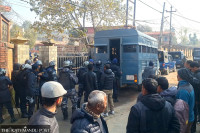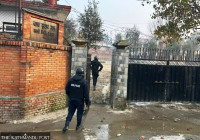Valley
Evicted vendors shift businesses to heritage sites
Street vendors evicted by the Kathmandu Metropolitan City (KMC) from core areas of the urban area have started setting up their businesses at various religious sites in the Capital.
Dipak Bayalkoti
The number of such vendors has been significantly increasing in Pashupatinath, Bauddha, Swyombhu, Kathmandu Durbar Square, and various other historical areas and places of worship where the footfall is usually high, KMC officials said.
The KMC, which has put a ban on street vending in public places, however, has not taken measures to keep such businesses away from these heritage sites. The increase in the number of street shops selling variety of merchandise ranging from foodstuffs, vegetables, fruits to electronics and textiles has hampered mobility of pedestrians in such areas.
“We have seen a significant rise in the number of vendors in heritage sites across the metropolis,” said Dhanapati Sapkota, chief at the KMC’s Department of Implementation. The street vendors have started shifting their businesses after dozens of city police from the KMC started evicting them from the core areas of the city. Sapkota assured that the city police will soon start evicting such vendors from the heritage sites.
“I am the sole bread winner for my family and have to provide education for my five children,” said Baburam Tamang, 44, a vendor who shifted his business from Khulamanch to Swyambhunath area some four months ago.
Hundreds of street vendors are agitated after the government decided to evict them from busy areas such as Khulamanch few months back. They have been demanding that the government provide them alternative vending zones in order to earn
their livelihood.
The KMC officials seized 4,393 vending materials and collected over Rs 2.9 million in fines from vendors during the last fiscal year. According to Implementation Department, they seized 714 carts selling momo, ice-cream, panipuri along with 654 cycles with clothes, vegetables and fruits.




 19.12°C Kathmandu
19.12°C Kathmandu











